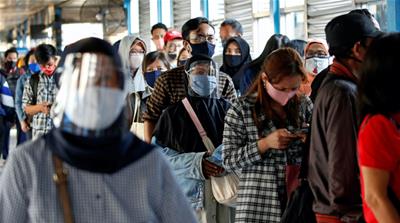Southeast Asia’s largest economy contracted by 5.3 percent in the second quarter due to coronavirus curbs.
Indonesia’s economy contracted for the first time in more than 20 years in the second quarter as efforts to contain the coronavirus dealt a blow to consumer demand and business activity in Southeast Asia’s largest economy.
Gross domestic product (GDP) shrank by a bigger-than-expected 5.32 percent in the April-June period from a year ago, according to data from Statistics Indonesia, the first contraction since 1999.
The economy had been expected to shrink 4.61 percent, according to a Reuters poll of economists, after growing by 2.97 percent year-on-year in the first quarter. Compared with the January-March quarter, the economy contracted by 4.19 percent on a non-seasonally adjusted basis.

The data showed a broad-based effect from the fallout of the pandemic, with households curbing spending and businesses delaying investments, while exports were also hit by lower global demand and commodity prices.
‘Long-term scars’
Indonesian shares turned negative, with the benchmark stock index slipping nearly 0.3 percent after the economic figures were released, while the rupiah currency was unchanged against the US dollar.
London-based bank HSBC said the contraction was broadly in line with its expectations. “But this should not detract from the immense socioeconomic damage caused by the virus, which risks leaving long-term scars,” it said in a research note.
Indonesia recorded 1,815 new coronavirus infections on Wednesday, bringing the total number of cases in the country to 116,871, data by the country’s health ministry showed. There were 64 additional deaths, taking the overall death toll to 5,452, the data showed.

Disbursement of government financial aid to people affected by the virus has been slow, analysts say [File: Willy Kurniawan/Reuters]
Read Also: Indonesia Floods66 Death As More Rain Is Expected
Indonesia’s central bank and the government earlier this month unveiled a $40bn debt-monetisation scheme, with Bank of Indonesia pledging to buy $28bn of government bonds while relinquishing interest payments.
The central bank has also cut its key interest rates four times this year by a total of one percentage point to the lowest since at least 2016 when it adopted the rate as its benchmark, in efforts to support growth.
But analysts have criticised the government’s implementation of its fiscal stimulus measures.
“Despite rolling out a substantial fiscal package worth 695 trillion Indonesian rupiah ($48bn), roughly only 20 percent of the budget was disbursed during the quarter forcing the President [Joko Widodo] to urge authorities to fast track disbursement in [the third quarter] to support the economy,” Dutch bank ING said in a research note.
It added that the outlook for the country’s economy remains bleak.
“The partial lockdown measures implemented in April remain in place until 13 August as Covid-19 new daily infections remain high,” ING added. “We forecast the economy to contract in the third-quarter too by 5.1% with pressure on Indonesian fiscal and monetary authorities to provide more stimulus to bolster sagging growth momentum.”
